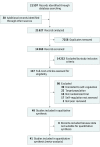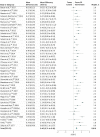Effectiveness of Universal Self-regulation-Based Interventions in Children and Adolescents: A Systematic Review and Meta-analysis
- PMID: 29710097
- PMCID: PMC6059379
- DOI: 10.1001/jamapediatrics.2018.0232
Effectiveness of Universal Self-regulation-Based Interventions in Children and Adolescents: A Systematic Review and Meta-analysis
Abstract
Importance: Childhood and adolescence self-regulation (SR) is gaining importance as a target of intervention because of mounting evidence of its positive associations with health, social and educational outcomes.
Objective: To conduct a systematic review and meta-analysis of rigorously evaluated interventions to improve self-regulation in children and adolescents.
Data sources: Keyword searches of the PsycINFO, PubMed, EMBASE, CINAHL Plus, ERIC, British Education Index, Child Development and Adolescent Studies, and CENTRAL were used to identify all studies published through July 2016.
Study selection: To be eligible for this review, studies had to report cluster randomized trials or randomized clinical trials, evaluate universal interventions designed to improve self-regulation in children and adolescents aged 0 to 19 years, include outcomes associated with self-regulation skills, and be published in a peer-reviewed journal with the full text available in English.
Data extraction and synthesis: A total of 14 369 published records were screened, of which 147 were identified for full-text review and 49 studies reporting 50 interventions were included in the final review. Results were summarized by narrative review and meta-analysis.
Main outcomes and measures: Self-regulation outcomes in children and adolescents.
Results: This review identified 17 cluster randomized trials and 32 randomized clinical trials evaluating self-regulation interventions, which included a total of 23 098 participants ranging in age from 2 to 17 years (median age, 6.0 years). Consistent improvement in self-regulation was reported in 16 of 21 curriculum-based interventions (76%), 4 of the 8 mindfulness and yoga interventions (50%), 5 of 9 family-based programs (56%), 4 of 6 exercise-based programs (67%), and 4 of 6 social and personal skills interventions (67%), or a total of 33 of 50 interventions (66%). A meta-analysis evaluating associations of interventions with self-regulation task performance scores showed a positive effect of such interventions with pooled effect size of 0.42 (95% CI, 0.32-0.53). Only 24 studies reported data on distal outcomes (29 outcomes). Positive associations were reported in 11 of 13 studies (85%) on academic achievement, 4 of 5 studies on substance abuse (80%), and in all studies reporting on conduct disorders (n = 3), studies on social skills (n = 2), studies on depression (n = 2), studies on behavioral problems (n = 2), and study on school suspensions (n = 1). No effect was seen on 2 studies reporting on academic achievement, 1 study reporting on substance abuse, and 1 additional study reporting on psychological well-being.
Conclusions and relevance: A wide range of interventions were successful in improving self-regulation in children and adolescents. There was improvement in distal academic, health, and behavioral outcomes in most intervention groups compared with controls.
Conflict of interest statement
Figures



Comment in
-
Regulating Our Enthusiasm for Self-regulation Interventions.JAMA Pediatr. 2018 Jun 1;172(6):520-522. doi: 10.1001/jamapediatrics.2018.0376. JAMA Pediatr. 2018. PMID: 29710291 No abstract available.
Similar articles
-
Systematic review of effectiveness of universal self-regulation-based interventions and their effects on distal health and social outcomes in children and adolescents: review protocol.Syst Rev. 2017 Aug 29;6(1):175. doi: 10.1186/s13643-017-0570-z. Syst Rev. 2017. PMID: 28851433 Free PMC article.
-
Recovery schools for improving behavioral and academic outcomes among students in recovery from substance use disorders: a systematic review.Campbell Syst Rev. 2018 Oct 4;14(1):1-86. doi: 10.4073/csr.2018.9. eCollection 2018. Campbell Syst Rev. 2018. PMID: 37131375 Free PMC article.
-
Social and Emotional Learning Associated With Universal Curriculum-Based Interventions in Early Childhood Education and Care Centers: A Systematic Review and Meta-analysis.JAMA Netw Open. 2018 Dec 7;1(8):e185727. doi: 10.1001/jamanetworkopen.2018.5727. JAMA Netw Open. 2018. PMID: 30646283 Free PMC article.
-
School-based interventions for reducing disciplinary school exclusion: a systematic review.Campbell Syst Rev. 2018 Jan 9;14(1):i-216. doi: 10.4073/csr.2018.1. eCollection 2018. Campbell Syst Rev. 2018. PMID: 37131379 Free PMC article.
-
Centre-based early education interventions for improving school readiness: A systematic review.Campbell Syst Rev. 2023 Dec 13;19(4):e1363. doi: 10.1002/cl2.1363. eCollection 2023 Dec. Campbell Syst Rev. 2023. PMID: 38093815 Free PMC article. Review.
Cited by
-
Effects of Mind-Body Interventions on Adolescents' Cooperativeness and Emotional Symptoms.Behav Sci (Basel). 2022 Feb 2;12(2):33. doi: 10.3390/bs12020033. Behav Sci (Basel). 2022. PMID: 35200284 Free PMC article.
-
Mental health and psychological resilience during the COVID-19 pandemic: A cross-cultural comparison of Japan, Malaysia, China, and the U.S.J Affect Disord. 2022 Aug 15;311:500-507. doi: 10.1016/j.jad.2022.05.032. Epub 2022 May 11. J Affect Disord. 2022. PMID: 35561884 Free PMC article.
-
Promoting Self-Regulation in Young Children: The Role of Parenting Interventions.Clin Child Fam Psychol Rev. 2019 Mar;22(1):43-51. doi: 10.1007/s10567-019-00281-5. Clin Child Fam Psychol Rev. 2019. PMID: 30715651 Review.
-
The Mediating Effect of Self-Regulation in the Association Between Poverty and Child Weight: A Systematic Review.Clin Child Fam Psychol Rev. 2019 Sep;22(3):290-315. doi: 10.1007/s10567-019-00279-z. Clin Child Fam Psychol Rev. 2019. PMID: 30725306 Free PMC article.
-
Examining the comorbidity network of Internet addiction and depression: the role of effortful control on their bridge symptoms in adolescents.Front Psychiatry. 2025 Feb 13;16:1493888. doi: 10.3389/fpsyt.2025.1493888. eCollection 2025. Front Psychiatry. 2025. PMID: 40018688 Free PMC article.
References
-
- Bronson MB. Recognizing and supporting the development of self-regulation in young children. Young Child. 2000;(March):32-37.
-
- Hughes C, Ensor R. Individual differences in growth in executive function across the transition to school predict externalizing and internalizing behaviors and self-perceived academic success at 6 years of age. J Exp Child Psychol. 2011;108(3):663-676. - PubMed
-
- Hughes C. Changes and challenges in 20 years of research into the development of executive functions. Infant Child Dev. 2011;20(3):251-271.
Publication types
MeSH terms
Grants and funding
LinkOut - more resources
Full Text Sources
Other Literature Sources
Medical
Research Materials

